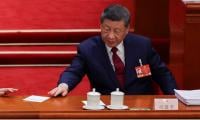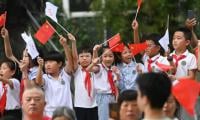MPs body on poll reforms to complete task in two weeks
Electoral reform body recommends defined
role of caretaker govt; suggests restricting it to day-to-day matters, not to take major decision, avoid transfers, promotions, appointments; IT Ministry okays biometric system for voters’ verification through off-line system
By Ansar Abbasi & Asim Yasin
ISLAMABAD: The Sub-committee of the Parliamentary Committee on Electoral Reforms will finalise its reports within two weeks’ time and would present it to the main committee for approval.
The meeting of the sub-committee of the Parliamentary Committee on Electoral Reforms was held and was chaired by its Chairman Zahid Hamid here Tuesday.During the meeting, the Ministry of Information Technology gave its nod for the biometric system for the verification of voters through an off-line system and in this regard it would hold meetings with the companies which were devising the off-line biometric system for the verification of voters on Thursday.
The committee considered the consultant reports unsatisfactory with regard to the decision of the superior courts declaring the elections of some constituencies as null and void. The committee directed the Election Commission of Pakistan to submit the reports through their consultants.
The sub-committee of the Parliamentary Committee on Electoral Reforms also completed the chapter with regard to powers of the caretaker governments.
Meanwhile, the Electoral Reforms Committee has recommended a defined role for the caretaker governments to restrict them to day-to-day matters ensuring that neither such governments take major decision nor get into the business of transfers, promotions and appointments.
Sources said that through a legal electoral reform package, the caretaker governments would be legally bound to attend to day-to-day matters which are necessary to run the affairs of the state besides assisting the Election Commission of Pakistan to hold elections in accordance with the law.
In order to bar such interim governments from taking major policy decisions or making key appointments, transfers and promotions in the civilian or military bureaucracy, the restricted role of the caretaker government will be defined through act of parliament.
Any posting or transfer in the administration could only be done by the caretaker government if required so by the Election Commission of Pakistan for the holding of fair, free and transparent elections. In case of any major policy decision, required to be taken by the caretaker on an emergency basis, the elected government will have the right to get it reversed.
The proposed Act, as discussed and agreed by the legal minds of the Electoral Reforms Committee, will make sure that the caretaker governments whether federal or provincial do not indulge in any such business which either questions their neutrality or pertains to policies which should be framed and finalised by the elected governments.
According to the sources, the following functions and powers of caretaker government have been recommended by the legal experts of the Electoral Reform Committee:
“Functions and powers of caretaker government: (1) The caretaker government shall perform its functions to attend the day-to-day matters which are necessary to run the affairs of the state and assist Election Commission of Pakistan to hold elections in accordance with the law.
(2) The caretaker government shall restrict itself to the activities that are routine and in public interest and reversible by the future government elected after the elections.
(3) The caretaker government shall be impartial.
(4) The caretaker government shall not:
(a) take major policy decisions except on urgent matters; (b) take any decision or make policies that would have effect or preempt the powers and jurisdiction of the future elected government; (c) enter into major contract or undertaking unless it would be detrimental to the public interest not to; (d) enter into major international negotiation with any foreign country or international agency or sign or ratify any international binding instrument; (e) make promotions or major appointments of public officials, but may make acting or short term appointments were these are urgent and in the public interest;(f) transfer and shuffle any government servant unless it is considered expedient to do so, provided that it shall intimate the same to the Election Commission of Pakistan; and (g) attempt to influence the elections or do or cause to be done, anything which can influence or affect the elections in any manner whatsoever.”
-
 Nicole Kidman's Daughter Sunday Rose Under Intense Backlash Post-Keith Urban Divorce
Nicole Kidman's Daughter Sunday Rose Under Intense Backlash Post-Keith Urban Divorce -
 Teddi Mellencamp Reveals Medication Side-effects Landed Her In The Hospital
Teddi Mellencamp Reveals Medication Side-effects Landed Her In The Hospital -
 Chase Stokes Calls Out Morgan Evans Over Comments On Kelsea Ballerini Split
Chase Stokes Calls Out Morgan Evans Over Comments On Kelsea Ballerini Split -
 Elon Musk Says Legal Pressure Forced Him To Pay Full Price For Twitter
Elon Musk Says Legal Pressure Forced Him To Pay Full Price For Twitter -
 Sarah Ferguson’s Downfall & Housing Crisis: Pals Make A Decision On Radioactive Ex-Duchess
Sarah Ferguson’s Downfall & Housing Crisis: Pals Make A Decision On Radioactive Ex-Duchess -
 Taylor Swift Faces Awkward Situation Ahead Of Her Wedding To Travis Kelce
Taylor Swift Faces Awkward Situation Ahead Of Her Wedding To Travis Kelce -
 Anthropic, Pentagon Resume Talks On ‘high Stakes’ AI Defense Deal
Anthropic, Pentagon Resume Talks On ‘high Stakes’ AI Defense Deal -
 OpenAI Annualized Revenue Hits $25 Billion Milestone Amid Global Adoption Surge
OpenAI Annualized Revenue Hits $25 Billion Milestone Amid Global Adoption Surge -
 Princesses Beatrice, Eugenie’s Parents Hurt Their Future With William, Kate: ‘The Knives Are Out’
Princesses Beatrice, Eugenie’s Parents Hurt Their Future With William, Kate: ‘The Knives Are Out’ -
 Billy Porter Claims He Came Back From The Dead Amid Sepsis Battle
Billy Porter Claims He Came Back From The Dead Amid Sepsis Battle -
 Jason Dickinson Reportedly Headed To Oilers In Trade With Chicago Blackhawks
Jason Dickinson Reportedly Headed To Oilers In Trade With Chicago Blackhawks -
 Harry Styles Hints He's Ready For Marriage And Family Life
Harry Styles Hints He's Ready For Marriage And Family Life -
 David Harbour’s Ex Faced Extreme Humiliation At Lily Allen’s Producer's Birthday Bash
David Harbour’s Ex Faced Extreme Humiliation At Lily Allen’s Producer's Birthday Bash -
 China Targets Tech Innovations Amid High Stakes Rivalry With US: Key Strategies Explained
China Targets Tech Innovations Amid High Stakes Rivalry With US: Key Strategies Explained -
 Pacers Vs Clippers: Kawhi Leonard Powers Clippers Past Pacers For Third Straight Win
Pacers Vs Clippers: Kawhi Leonard Powers Clippers Past Pacers For Third Straight Win -
 Scientists Build Tiny AI Brain Model Using Monkey Neurone Data
Scientists Build Tiny AI Brain Model Using Monkey Neurone Data



